Customer Journey Map Templates (+ Examples and Prompts)
If you’re a busy marketer looking for copy-and-paste customer journey map templates, we’ve got something even better. Our AI-powered Customer Journey Map Generator will help you draft a customer journey map, instantly and free.
How to Use our Customer Journey Map Generator
Just answer a few questions and we’ll draft a customer journey map, instantly and free. Remember: the more information you give it, the better your final customer journey map.
More AI Prompts for Customer Journey Maps
Once you’ve drafted your customer journey map using the generator above, you can use these follow-up prompts to refine it further, until you’re thrilled with the final product.
- Identify touchpoints: Help me identify all the touchpoints a customer encounters throughout their journey.
- Improve tone and style: Rewrite this section to adopt a more formal/ playful/ professional tone.
- Define pain points: Suggest potential pain points that customers might encounter during their journeys.
- Enhance customer emotions: Provide suggestions on how to evoke specific emotions at each stage of the customer journey.
- Optimize content placement: Recommend where to place relevant content or information to improve customer engagement.
- Refine user interactions: Suggest ways to simplify or streamline customer interactions with our digital platforms.
- Personalize the experience: Propose methods to tailor the customer journey based on individual preferences or demographics.
- Address customer needs: Help me identify the specific needs that customers have at different stages of their journeys.
- Identify conversion opportunities: Highlight potential opportunities to convert customers at various touchpoints.
- Analyze customer feedback: Assist in analyzing customer feedback to identify areas of improvement or satisfaction.
Examples of Great Customer Journey Maps
Did you know that according to Salesforce, 88% of high-performing teams state that a customer journey strategy is vital to the success of their overall marketing? If nearly nine out of ten leading teams believe this is important, it should not be overlooked.
In the same way that leading a team of people along a difficult path in the dark would be a grave mistake, executing a marketing strategy without a well-thought-out customer journey map is also a grave mistake.
Let’s look at a few examples of what some companies are doing to understand their customers and their journeys better and craft a marketing strategy that is directly aligned with that journey.
Spotify
Spotify, one of the biggest audio streaming services in the world, knows a thing or two about its customers. More specifically, the company deeply understands each customer’s journey and the strategies needed along that journey.
They developed a Spotify customer journey map that tracked the customers from when they first opened the app to how they reacted when a song was shared with them.
Here’s what the map looks like:
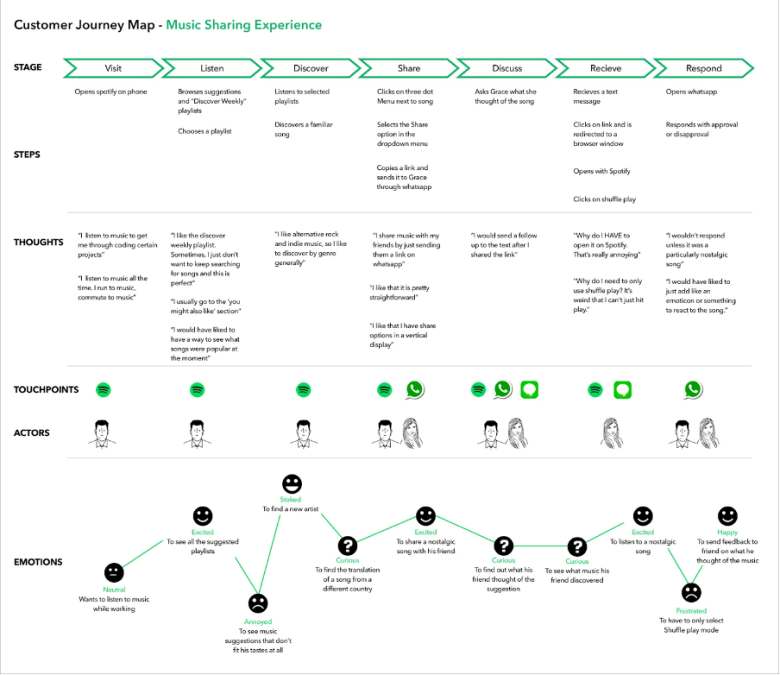
Amazon
Amazon’s customer journey map is quite possibly one of the most complex that we’ve come across. Take a look here to see what we mean.
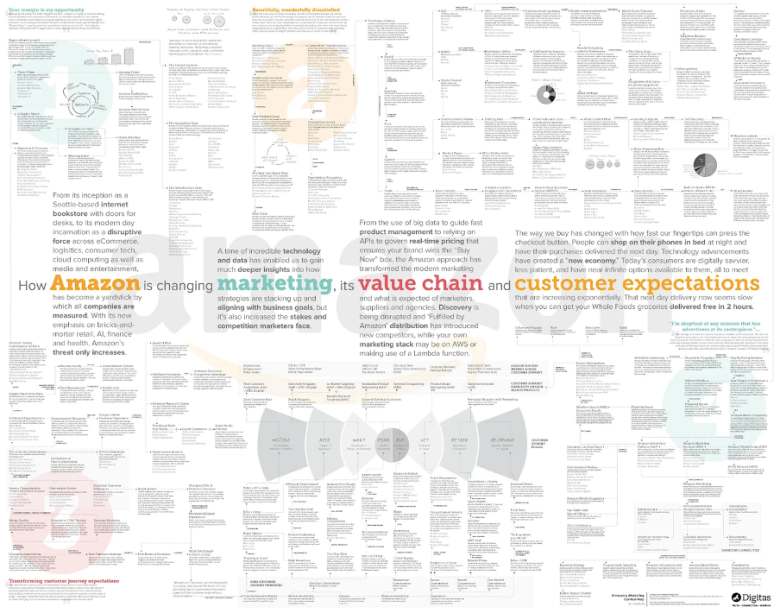
It’s not quite as simple as the earlier Spotify example, but what’s great about this map is that it is broken down into easy-to-understand parts like this.
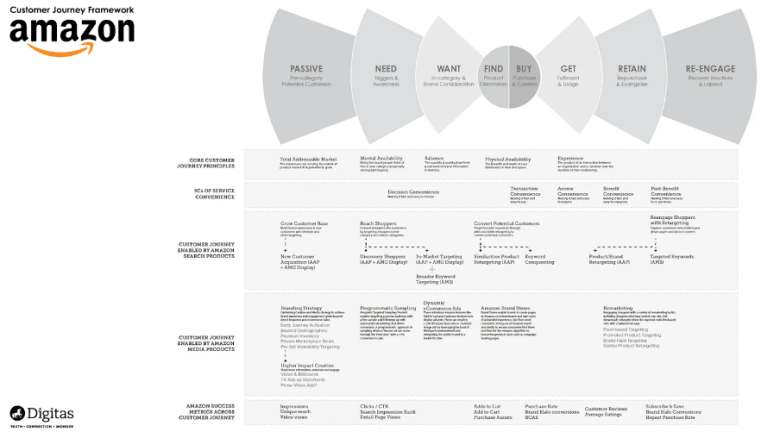 We won’t discuss each element of this customer journey as it’s far too complex, but Amazon has done well by including success metrics for each stage. This will allow you to measure success when fine-tuning your customer journey.
We won’t discuss each element of this customer journey as it’s far too complex, but Amazon has done well by including success metrics for each stage. This will allow you to measure success when fine-tuning your customer journey.
Netflix
What Netflix did with their customer journey map is similar to what Spotify did. In that stage, emotions and thoughts are key features. What they have done differently, though, is create goals for each touchpoint. These are identified as ‘motivations,’ ‘pain points,’ and ‘opportunities.’ By including a section on opportunities, they are including strategies to address each pain point. Take a look to see what we mean in Netflix’s customer journey map below.
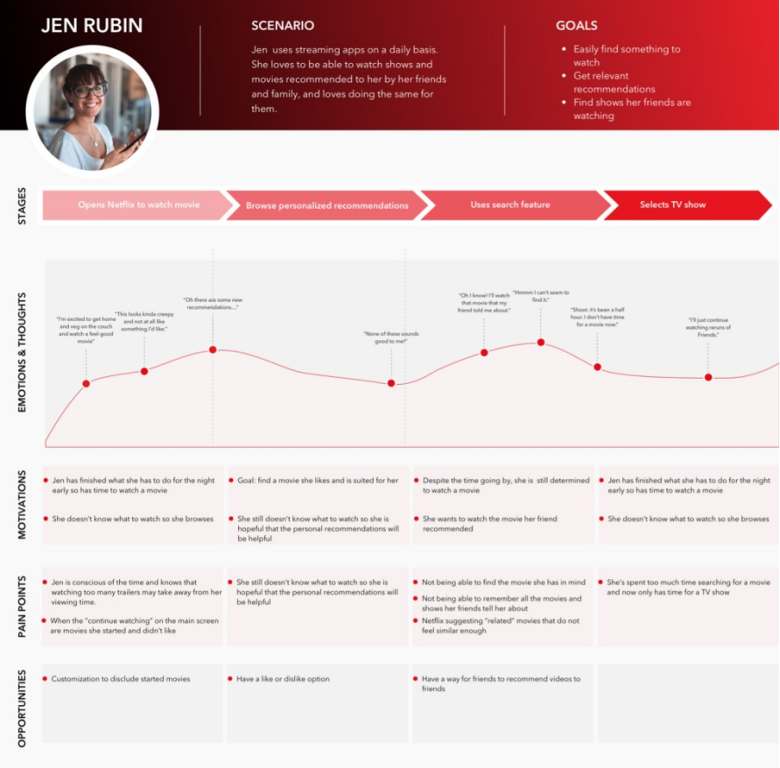
As you can see, they have created a persona for this specific customer journey. By doing so, they can develop a set scenario for this particular type of customer. This strategy is exciting if you have multiple groups of target customers.
John Smith Brokers
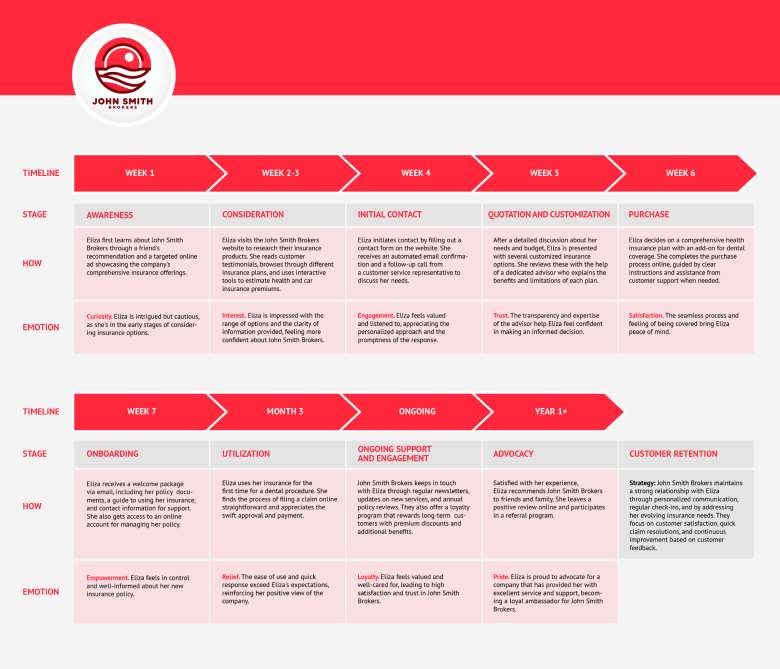
This journey map gives great time-focused detail, making it useful as an adjunct to a CMS platform. Each step is mapped out on a timeline that could be used as a template for customer acquisition efforts. Best of all, it continues beyond 1 year, and additional upsell opportunities could be baked into the roadmap at appropriate times.
These are just a few great examples of customer journey maps that have allowed businesses to create great customer experiences across very different industries.
10 Best Practices for Customer Journey Map Templates
- Clearly define the stages: Ensure your customer journey map includes distinct stages that reflect the customer’s progression from awareness to purchase and beyond.
- Use customer personas: Develop detailed customer personas to guide your map and better understand your target audience’s motivations, needs, and pain points.
- Include touchpoints: Identify and map out all the touchpoints your customers encounter, both online and offline, to understand the interactions and experiences of each stage.
- Incorporate emotions: Consider the emotional journey of your customers and identify opportunities to evoke positive emotions or address negative ones throughout their journeys.
- Validate with data: Back your customer journey map with data (like customer feedback, surveys, analytics, and user research) to ensure accuracy and reliability.
- Collaborate across teams: Involve stakeholders from different departments (including sales, customer support, and product development) to gain diverse perspectives and align strategies.
- Visualize the map: Present your customer journey map in a visual format that’s easy to understand and share, allowing for quick reference and collaboration.
- Iterate and update: Continuously refine and update your customer journey map based on new insights, changing customer behaviors, and evolving market dynamics.
- Test and validate assumptions: Validate your assumptions by conducting user testing or gathering feedback from real customers to ensure the accuracy and relevance of your map.
- Use as a strategic tool: Treat your customer journey map as a strategic tool to drive customer-centric decision making, improve experiences, and identify opportunities for growth.

Frequently Asked Questions
What is a customer journey map template, and how can it benefit my marketing strategy?
How do I create an effective customer journey map template?
What are the essential components to include in a customer journey map template?
How often should I update my customer journey map template?
What role do customer personas play in creating customer journey map templates?
Can customer journey map templates be used for different types of businesses?
How can I gather the data needed to create an accurate customer journey map template?
Are there any tools or software available to help create customer journey map templates?
How can I ensure that my customer journey map template is actionable and impactful?
10 Protips for Customer Journey Map Templates
- Customer Persona Development: Conduct thorough research to create detailed and accurate customer personas.
- Touchpoint Identification: Identify and include all touchpoints to create a holistic customer journey map.
- Emotional Journey Mapping: Map out key moments that evoke strong emotions to enhance the customer experience.
- Pain Point Analysis: Analyze customer pain points at each stage and devise effective solutions.
- Data-Driven Iteration: Use data and feedback to iteratively improve and refine your customer journey map.
- Collaborative Approach: Cross-functional collaboration. Involve stakeholders from different teams to gain diverse insights and create a comprehensive map.
- Visual Storytelling: Use visual elements to convey the customer journey effectively and engage stakeholders.
- Regular Updates: Regularly update your customer journey map to reflect changes in customer behavior and market dynamics and to stay current.
- Test and Validate Assumptions: Real-user validation. Test assumptions and gather feedback from actual customers to ensure accuracy.
- Actionable Insights: Ensure your customer journey map provides practical guidance for decision-making and improvements.
The Media Shower platform lets you draft great customer journey maps using our AI assistants, with an award-winning creative team to make them into marketing magic. Click for a free trial.


